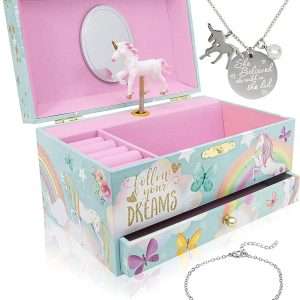Children's Jewelry Boxes
The Memory Building Company Musical Jewelry Box – Birthday Gifts and Toys for Kids
The Miracle of Life: Exploring the Journey of Birth and Its Significance
Life’s most profound moments often begin with a single heartbeat—a gentle reminder of the miracle unfolding within. The birth journey is filled with anticipation, joy, and complexity. From the initial signs of labor to the first cries that fill a room, every stage holds significance for the newborn and those who welcome them into this world.
As we explore this incredible process, we’ll delve into its physical intricacies and emotional depths while considering how different cultures and histories shape our understanding of childbirth. We’ll also reflect on modern medicine’s role in ensuring safe deliveries and examine various religious perspectives celebrating life’s beginnings. So join us as we embark on an enlightening exploration of what makes birth such a remarkable experience—a celebration worth honoring from day one!
The Physical Process of Birth
The physical process of birth is a symphony of biological changes. It begins with contractions and rhythmic tightenings that signal the uterus preparing for delivery. These waves help to dilate the cervix, creating an opening for the baby to move through.
As labor progresses, each contraction brings the infant closer to exit. The mother’s body instinctively responds to these sensations, often leading her into various positions for comfort and support.
Once fully dilated, it’s time for pushing—an intense but transformative stage where mothers harness their strength and focus on bringing new life into the world. This moment is raw and powerful, a dance between effort and surrender.
As the baby emerges, there’s relief and joy in the air. A new chapter unfolds as they take their first breath—a moment etched in memory forever.
The Emotional Journey for Expectant Parents
Becoming a parent is an emotional rollercoaster. Expectant parents experience a wide array of feelings, from sheer joy to overwhelming anxiety.
The anticipation of welcoming a new life can spark excitement. Every kick and movement becomes a reminder of the miracle unfolding within. Yet, this joy often coexists with fears about parenting abilities and future responsibilities.
Hormonal changes add complexity to these emotions. Mood swings are common as expectant mothers navigate their physical transformations. Partners may also feel the weight of impending change, leading to moments of doubt or insecurity.
Support systems play a crucial role during this journey. Sharing experiences with friends or family can lighten burdens and foster connection. Engaging in open conversations nurtures understanding and strengthens bonds between partners.
As the due date approaches, emotions may intensify further—an exhilarating blend of hope and vulnerability fills the air, marking this unique chapter in life’s narrative.
Cultural and Historical Perspectives on Birth
Throughout history, the act of birth has been surrounded by rituals and traditions that reflect a society’s values and beliefs. In many cultures, childbirth is celebrated with ceremonies steeped in symbolism. These rites often honor the mother and the newborn, recognizing their connection to family and community.
Ancient civilizations viewed birth as a mystical event. For instance, in Egyptian culture, the goddess Hathor was revered as a protector of mothers during labor. Similarly, indigenous tribes may hold sacred gatherings to mark this transformative journey.
In contrast, industrialization brought about significant shifts in how societies approach childbirth. The emergence of hospitals introduced new medical practices but also changed familial roles during delivery.
These cultural narratives continue to evolve today as more people seek personalized birthing experiences while acknowledging traditional practices. Each perspective enriches our understanding of life’s beginnings across diverse backgrounds.
The Role of Modern Medicine in Childbirth
Modern medicine has transformed the childbirth experience, ensuring safety and comfort for both mother and child. Advances in technology provide expectant parents with once unimaginable resources.
Ultrasounds help visualize the developing baby, giving families a sneak peek weeks before birth. This reassurance fosters emotional connections early on.
Pain management techniques, including epidurals and medication options, have redefined labor experiences. Women can choose their ideal balance of awareness and comfort.
Additionally, skilled healthcare professionals closely monitor the mother and baby’s health during delivery. If complications arise, immediate interventions are possible.
Postpartum care has also evolved significantly. Support systems now focus on not just physical recovery but also mental well-being.
All these innovations shape a safer environment for bringing new life into the world while respecting individual choices.
The Significance of Birth in Different Religions
Birth holds profound significance across various religions and is often viewed as a divine gift. In Christianity, the nativity of Jesus symbolizes hope and salvation, shaping celebrations like Christmas.
Hinduism regards birth as part of the cycle of samsara—the continuous cycle of life, death, and rebirth. Each new life is an opportunity for spiritual growth and enlightenment.
In Buddhism, birth is seen through the lens of suffering; attachment to this world can lead to pain. Yet each birth also represents a chance for liberation from that cycle.
Islam emphasizes gratitude for children as blessings from Allah. The arrival of a newborn is celebrated with prayers and rituals affirming faith.
These diverse perspectives illustrate how sacred the act of giving life truly is within different cultures. Each belief system cherishes the journey into existence while fostering deep connections among families and communities.
Honoring and Celebrating the Miracle of Life
Honoring and celebrating the miracle of life is essential for both parents and communities. Birth represents a fresh start, filled with potential and promise. Each child brings unique traits that contribute to the fabric of society.
Celebrations around birth differ widely across cultures, yet they share common threads. Baby showers, naming ceremonies, or even simple family gatherings highlight joy in welcoming new lives and help create lasting connections among family members and friends.
Gifts play a significant role during these celebrations. Selecting thoughtful birthday gifts and toys for kids can symbolize love and support for their journey ahead. Items like educational toys encourage growth, while plush companions provide comfort as children navigate their early years.
It’s essential to recognize that every child’s arrival is a personal milestone and a communal event. Embracing this occasion fosters unity within families and neighborhoods alike. By acknowledging the significance of each birth, we celebrate diversity in experiences while reaffirming our shared humanity.
Honoring life through these practices cultivates appreciation for growth—individual journeys and collective stories unfolding within our world.


